One of the challenges of learning any language is knowing when to use a new word in the correct context. How do we know how to use them correctly?
This is the first post in a series of blog articles aimed at trying to solve some of the issues we have with using Chinese words/characters correctly or in the right situation.
Many of these questions have come from our users, but I’m sure that many other students of Chinese have also at one point or another also felt confused about using these characters.

This article looks at the three modal verbs 会 (huì),可以 (kě yǐ) and 能 (néng) and how to use them correctly. Of course, like all rules, there are always anomalies, so if you feel that some important rule is missing from this post, please leave a comment below.
Before we begin, here’s what each character means:
会 (huì): can / to be possible / to be able to / will / to be likely to
可以 (kě yǐ): can / may / possible / able to
能 (néng) can / to be able to / might possibly
会 (huì) and 可以 (kě yǐ)
When I first began to learn Chinese, the first ‘can’ I learned was 会 (huì), as in 我会说中文 (wǒ huì shuō zhōng wén) ‘ I can speak Chinese’, although at the time that was obviously a bit of a fib.
Next, I learned 可以 (kě yǐ). For the longest time I used this word/bigram without actually knowing what this even meant and used it for practically everything that could not be replied to with 对 (duì)!Eventually, I discovered that 可以 (kě yǐ) also meant ‘can’, and this is when I asked the question that many of you have asked:
‘What’s the difference between 会 (huì) and 可以 (kě yǐ)?’
My Chinese teacher informed me that:
会 (huì) is used for a learned skill such as being able to ride a bike, swim or speak a foreign language.

我会骑单车。 (wǒ huì qí dān chē) I can ride a bike.
我会游泳。 (wǒ huì yóu yǒng.) I can swim.
我会说波兰语。 (wǒ huì shuō bō lán yǔ) I can speak Polish.
and
可以 (kě yǐ) is used when expressing permission to do something.
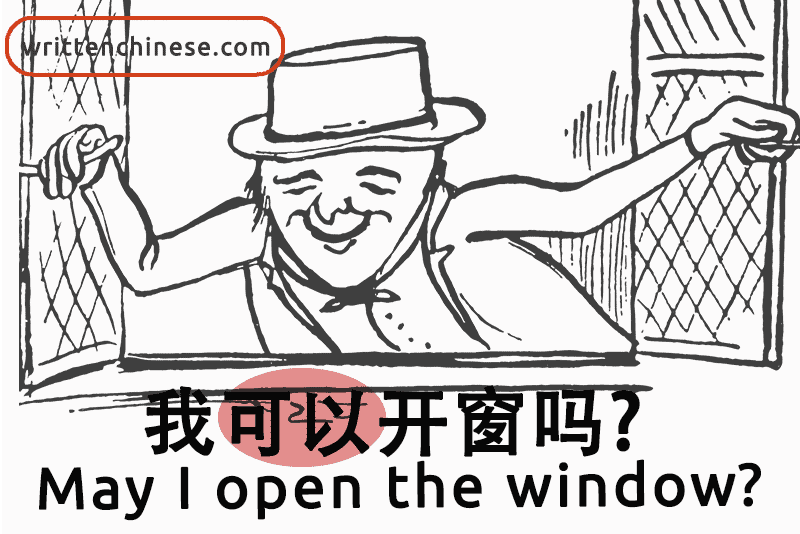
In English, 可以 (kě yǐ) is probably better translated as ‘may’, although ‘can’ is obviously less formal and more commonly used in oral English.
For example:
我可以开窗吗? (wǒ kě yǐ kāi chuāng ma?) May I open the window?
The response is as simple as 可以 (kě yǐ) or 不可以 (bù kě yǐ).
Little did my naive self-know that there was yet another ‘can’ waiting around the corner to beat me with its linguistic scorn!
能 (néng) can
Finally, came 能 (néng). You can actually look at the character itself to help you understand the meaning of this ‘can’. A user on our Written Chinese Dictionary left us a great way to remember the ‘nature’ of this character.

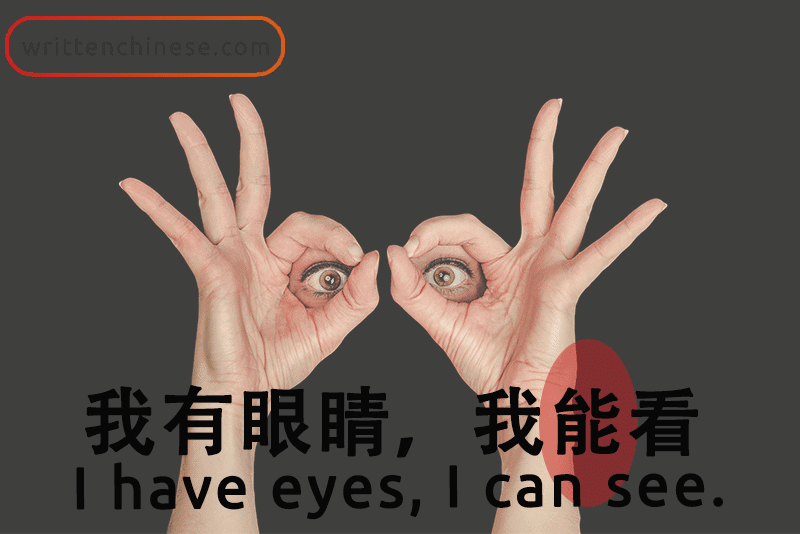
For example:
我有眼睛,我能看。 (wǒ yǒu yǎn jing, wǒ néng kàn.) I have eyes, I can see.
Being able to see is an ability that is natural to us, not learned.
能 is used when an ability has already reached a certain level or is reduced in some way
For example:
他一天能记住50个汉字。 (tā yī tiān néng jì zhu 50 gè hàn zì.) He can remember 50 Chinese characters per day.
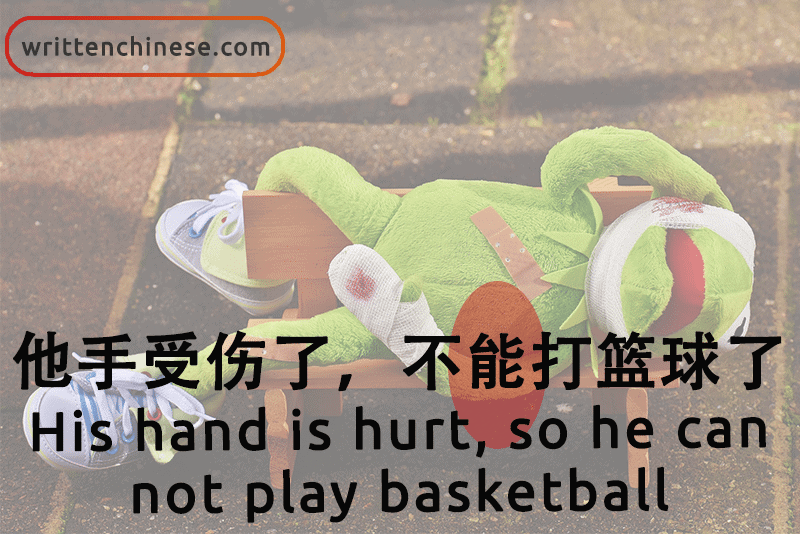
他手受伤了,不能打篮球了。 (tā shǒu shòu shāng le, bù néng dǎ lán qiú le.) His hand is hurt, so he can not play basketball.
Although playing basketball and learning Chinese characters would be classed as a learned ability, in this case, 能 (néng) is used because, in the first example, the person has reached a certain level, or, as in the second example, has temporarily lost or recovered an ability.
To emphasize the meaning of 能 (néng) and 会 (huì) use intensifiers such as 很 (hěn) or 真 (zhēn)
For example:
他真能吃。 (tā zhēn néng chī) He can really eat!

他真会吃。 (tā zhēn huì chī) He’s a foodie.
真能吃 (zhēn néng chī) means he can eat a lot and that the speaker is somewhat impressed by it. 真会吃 (zhēn huì chī), on the other hand, means that the subject’s ability to do something is at a high level. In this case, he understands about food and knows how to enjoy it.
When there is a ‘possibility’ use 能 (néng) or 会 (huì)
会 (huì) is used to describe something that will probably happen in the future.
For example:
明天会下雨 (míng tiān huì xià yǔ.) It might rain tomorrow.
And
别催我,我会做完作业再回家的! (bié cuī wǒ, wǒ huì zuò wán zuò yè zài huí jiā de!) Do not force me, I will finish all the homework before I go home!
In this case, 会 (huì) is used because the subject is able to finish the homework because it is a learned skill.
能 (néng) can also be used when a situation allows an action to happen:
现在时间还早,我能做完作业再回家。(xiàn zài shí jiān hái zǎo, wǒ néng zuò wán zuò yè zài huí jiā.) It’s still early, I can finish my homework before I go home.
The fact that it is early allows the subject to ‘be able’ to finish the homework.
When 不能 (bù néng) is used, this often refers to something which is not allowed, such as smoking, or littering
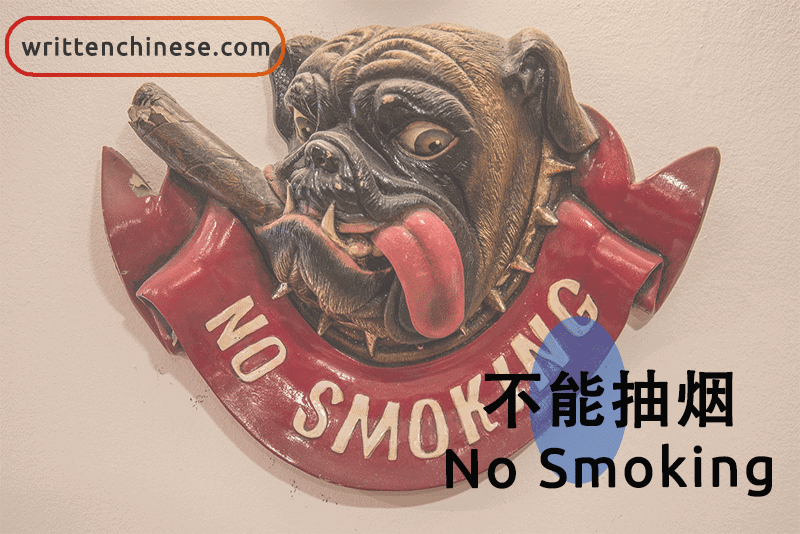
不能抽烟。(bù néng chōu yān) No Smoking
不能乱扔。(bù néng luàn rēng) No Littering
Have a look at the following sentences and try and use the correct characters:
1. 你去找他吧,他认识不少人,_____帮你这个忙的。(nǐ qù zhǎo tā ba, tā rèn shi bù shǎo rén _____________bāng nǐ zhè ge máng de.) Go and find him, he knows many people ____________ help you.
2. 你去找她吧,她很热心助人,_____帮你这个忙的。(nǐ qù zhǎo tā ba, tā hěn rè xīn zhù rén, _____________ bāng nǐ zhè ge máng de.) Go and find him, he’s very enthusiastic to help people _________________ help you.
The correct answers will be at the bottom of the post, so keep reading!
Negating Modal Verbs
It’s also good to know that modal verbs should be negated using 不 (bù) and never with 没 (méi).
For example:
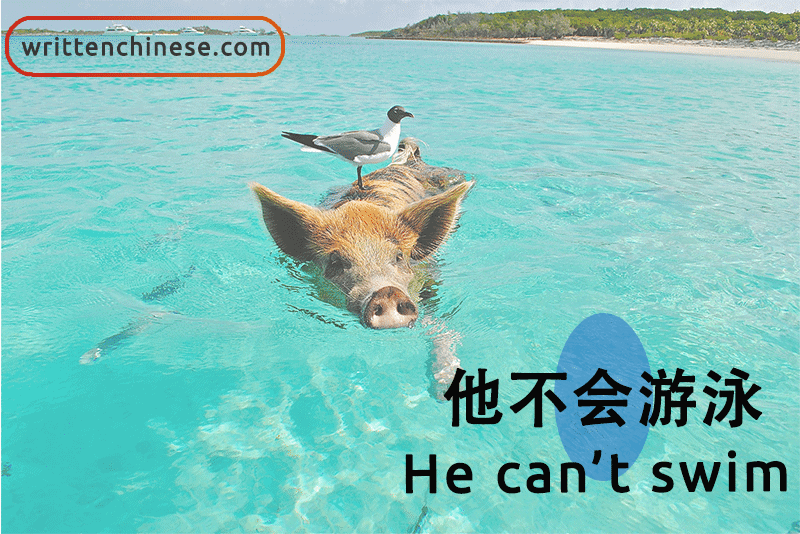
他不会游泳 (tā bù huì yóu yǒng) instead of 他没游泳 (tā méi yóu yǒng) meaning ‘He can’t swim’.
Here’s a quick summary of using 会 (huì), 可以 (kě yǐ) and 能 (néng)
会 (huì) is used to discuss:
a learned skill.
the possibility or likelihood that something will happen in the future.
可以 (kě yǐ) is used to express:
permission (or refuse permission).
能 (néng) is used to express:
a natural ability to do something (or not).
The answers for using 会 (huì) and 能 (néng) to describe a possibility are:
1. 能
2. 会
Don’t forget, if you have any questions or additional comments to add to this post please leave them below!

